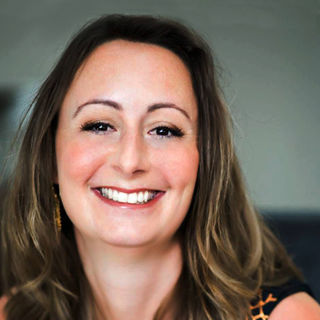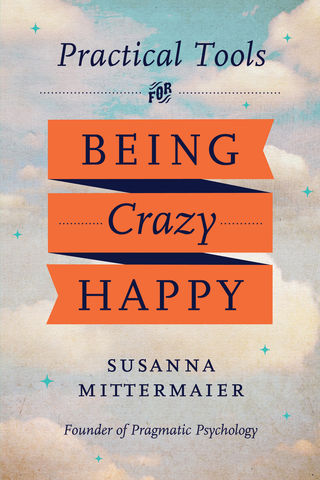Happiness
Practical Tools for Being Crazy Happy
The Book Brigade talks to psychotherapist Susanna Mittermaier.
Posted January 24, 2019

Is it possible to be happy in a world that has more than its share of pressing problems and delivers a steady stream of bad news? You decide!
Let’s start even before the beginning: Do we really need to be crazy happy?
There is never a need of anything. There is always choice. Happiness is a choice.
Doesn’t the title alone set up a false expectation that we should go around being crazy happy or that that is the goal of life?
What world are we living in? A happy world or a world that is dedicated to difficulties? Being surrounded by bad news and troubles can make it challenging to be happy. Often it even seems impossible. Being crazy happy is the choice to be happy even if it might seem crazy. Happiness creates a space where we are not the effect of the reality of problems and difficulties that are being made real every day and where we can create beyond it.
How does a person know whether it is time to be crazy happy?
It is always time to be happy. Being unhappy can make one happy as well. Happiness does not exclude unhappiness. You can enjoy sadness just as much as you can enjoy happiness.
What do you mean by people having a “wrongness” of themselves?
Many people are judging everything they do and say, constantly censoring themselves and anticipating the next mistake they might make.
What is the paradigm of psychology that you rejected, and why?
There is no rejection. Pragmatic means doing what works, whatever that is. What works for one person might not work for the other. Every paradigm creates a different possibility. None of them is right or wrong. They are just different.
And what is the paradigm of psychology that you have chosen, and why?
Pragmatic Psychology is about empowering people to know that they know. I used to wonder what else is possible with the patients I worked with. The doctor would send them to me for neuropsychological testing and psychotherapy, asking me to see what was wrong with the patient and then fix the problem. When I met these people, I had a hard time seeing the problem. All I could see was a person who is different, functions differently, sees the world differently and has concluded that this must mean that they are crazy, and that crazy was bad. I asked, what else is possible? I knew that there must be some other approach possible. That is when Pragmatic Psychology was created, the celebration of diversity and the invitation to be everything you are and use what is right about you and what is wrong about you to create a life that works for you. Going beyond what is normal and accessing the true brilliance of you.
Why do we think change is hard, and how can it be made easy and fast?
I never say that change is hard. Quite the opposite. Change is not hard unless we make it hard. Change is often chosen from need and lack rather than the joy of change. You can say “I have to change this” or you can say, “I can change this.” The point of view of having to change something comes from resisting the change. Knowing you can change something and looking forward to the change and asking how you can change it, allows you to jump tracks to a future that works better for you.
What is it that people most need to change?
From my point of view, there is no need to change anything. Allowance is a big key to change. You can allow yourself to not change rather than thinking you need to change.
Judgments are important, but you are emphatic that they are also crippling. Can you explain?
Most people think that they need judgments to determine what to do and to make sure we are making the right decisions. In actuality, we do not need judgments when we function from knowing. You know more than you think. You know when something will work for you or not. Judgments are the crutches that we think we need that we don’t truly need. We can just walk.
What do you consider the single most important tool for creating happiness?
Choice! It's not a "how". It is saying “I will choose to be happy no matter what!” Start demanding of yourself to be happy no matter what occurs today.
What other tools are important?
Choosing in 10-second increments. When you choose to be happy, you might be thrown off by a situation showing up that you did not expect, and you might react and choose to be upset. Choose again. Even if you choose to be upset for 10 seconds, enjoy the upset, don’t resist it and then choose again and again. It takes practice to choose. We have been practicing to react for the most part of our lives. Now you can move from reacting to acting.
If you had one message to give people, what would it be?
Even if your life does not look the way you would like it right now, know that you can change it. Your past does not determine your future. You can learn to use your past as a springboard to a future that works great for you. Everything in life, even your past, your relationship, your job, your money situation, can be turned from a problem to a possibility. What if ease and joy and glory were the future you are heading for? And what if you start today!
About THE AUTHOR SPEAKS: Selected authors, in their own words, reveal the story behind the story. Authors are featured thanks to promotional placement by their publishing houses.
To purchase this book, visit:
Practical tools for being crazy happy





